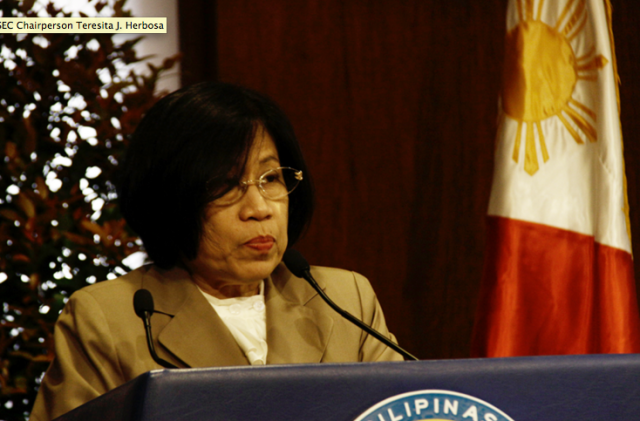MANILA – Securities and Exchange Commission (SEC) has moved to regulate fund raising via the Internet, a mode used especially by micro, small and medium enterprises (MSMEs).
A draft memorandum circular providing rules and regulations for crowdfunding (CF), posted on Nov. 29 on the Web site of the Securities and Exchange Commission, “shall primarily govern the operation and use of equity-based and lending-based CF by registered persons such as brokers, investment houses, funding portal, and issuers and investors…”
The World Bank has actually noted that the Internet has been used for alternative financing for varied purposes such as donations, equity and lending. The SEC seeks to regulate crowdfunding for the purpose of raising capital for start-ups in exchange for equity, interest and other forms of return on investment.
This fund-raising mode has been particularly tapped by MSMEs, which Republic Act No. 9501 or the Magna Carta for MSMEs defines as businesses with assets worth up to P3 million for the micro category, more than P3 million up to P15 million for the small segment, and more than P15 million up to P100 million for medium-scale enterprises.
SEC Chairperson Teresita J. Herbosa had first disclosed in October last year the regulator’s plan to draft rules and regulation for this funding mode, citing its increasing use and the need to guard against investment scams.
The draft rules cap crowdfunding volume within any 12-month period to P10 million per issuer, and aggregate amount of securities sold to any investor “across all issuers” at P50,000 within the same duration.
Moreover, there should be only one “intermediary” — defined as a registered broker, investment house or funding portal which handles the sale of crowdfunding securities — per offer drawn from SEC’s list of registered CF intermediaries.
Issuers should inform investors of the identity of the chosen intermediary, risks of investing in the project, procedure on how funds will be returned if total fund target is not met, and procedure to complete or cancel investment commitment, among others.
Separately, advertisement of any offer should be limited to a statement that the issuer is conducting an offering; the name of the intermediary through which the offering is being conducted and a link directing potential investors to the intermediary’s electronic platform; terms of the offering; as well as the name of the issuer of the security, the address, phone number and Web site of the issuer, the e-mail address of a representative of the issuer and a brief description of the business of the issuer.
Crowdfunding intermediaries bear much of the burden of ensuring the integrity of the offer.
Among others, the draft charges intermediaries with the task of guarding against potential conflicts of interest which “must be managed in a timely manner.” This includes prohibiting the intermediary and its officers from providing financial assistance to investors to invest in the securities offered through its platform and from funding issuers, among others.
The draft circular provides further that intermediaries must have “reasonable basis” for believing that the issuer has accurately presented information on the business for which funds raised will be used, and should deny use of its platform if it has such basis for believing that the issuer “presents the potential for fraud or otherwise raises concerns about investor protection.”
Before accepting any investment commitment, an intermediary must also have “reasonable basis” to believe that the investor concerned satisfies the rule’s investment limits.
Investors who want to cancel their investment commitments have until 48 hours before the offer’s deadline to do so. No cancellation is allowed within the 48-hour period.
If the issuer fails to complete the offering, the intermediary will then have the task of sending investors the notice of cancellation alongside the reason for the cancellation, hand out the refund to investors, and prevent investors from further making further commitments on that offer on the same platform.
Both issuer and intermediary must file with the SEC and post on their Web sites annual reports, along with financial statements of the issuer certified by its principal executive officer to be true and complete, as well as a report on all crowdfunding transactions within the year being reported.
Moreover, all records of a funding portal are subject “at any time, or from time to time, to reasonable periodic, special, or other examination by the representatives” of the SEC. — A. B. Francia










